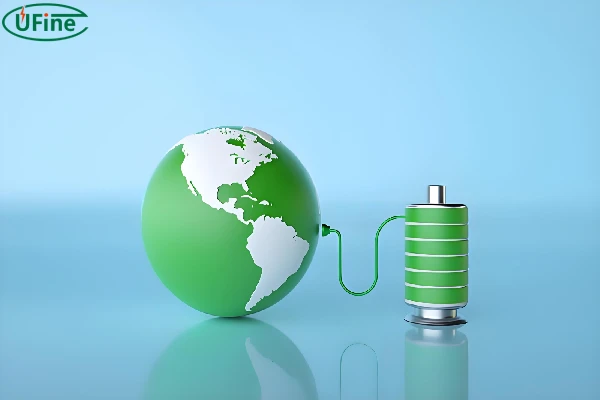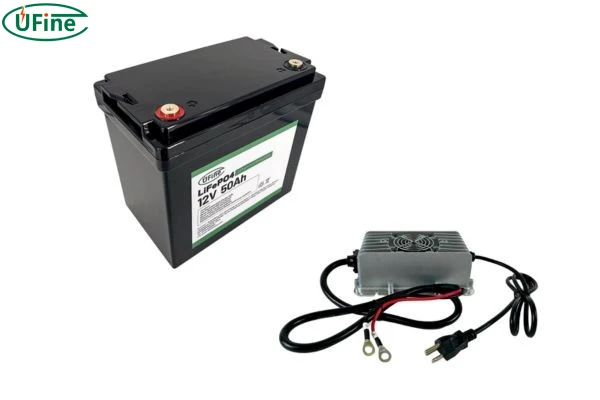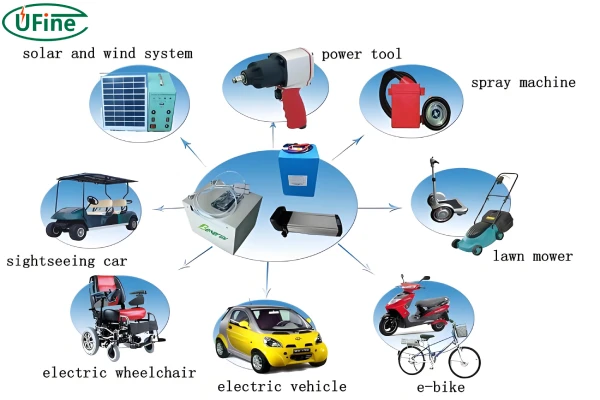A deep cycle lithium battery is a step ahead in lithium battery technology. The purpose is to utilize the full battery capacity so the electronic devices can perform for longer periods. This article will explore a deep cycle lithium battery, its types, charging mechanism, and usability in electric devices.

Part 1. What is the deep cycle lithium battery?
A deep cycle lithium battery is a rechargeable battery specifically designed to handle deep discharge and charge capabilities. The purpose of the battery is to provide energy to electric devices for an extended period. Despite being deeply discharged and charged, the battery is resistant to degradation. It can handle hundreds, even thousands, of charging cycles without losing efficiency.
For a better understanding, a lithium battery cycle life depends upon the Depth of Discharge (DoD) ratings. So, the higher DoD percentage means the battery can be discharged deeply. If a battery’s DoD is 100%, it can use its full discharging capacity.
Types of Deep Cycle Lithium Batteries
1.LiFePO4 Battery
Lithium iron phosphate, known as LiFePO4, has a maximum Depth of Discharge capacity of 98% to 100%. However, most manufacturers recommend using 80% DoD to achieve a longer lithium battery cycle life.
2. Lithium-ion Battery
A lithium-ion battery has high energy density and is lighter in weight. But it can lose its efficiency if you discharge the battery completely. It has an 80% DoD rating in the case of discharging the battery; lowering it to 80% results in battery degradation. So, we recommend charging the battery when it goes to 70% DoD.
3. Lithium Polymer (Li-poly) Battery
It is a less common deep cycle lithium battery to faster degradation and safety concerns. Lithium polymer has an 80% depth of discharge.
Part 2. Are all lithium batteries deep cycle?
There is a misconception that all lithium-ion batteries are deep cycle batteries. But the situation is the opposite. Even the lithium batteries of smartphones, laptops, and portable devices are designed to provide instant bursts of energy. These are not deep cycle lithium batteries. On the other hand, a deep cycle battery provides continuous energy to the devices for an extended period. The term “deep cycle” refers to a repeated discharge to a low state of charge and then recharge. So, using a regular lithium-ion battery in such devices can cause premature failure.
Part 3. How long does the lithium deep cycle battery last?
Lithium batteries are an advanced and convenient replacement for traditional lead acid batteries. Before lithium batteries, we had to use lead-acid batteries in many electronic devices. But these batteries need frequent replacement and time-to-time maintenance. Therefore, as a successor to lead acid batteries, lithium batteries do not need frequent change or maintenance. Here are the deep cycle lithium batteries that can last many years.
1. Lithium Iron Phosphate (LiFePO4) Battery
It is a widely used battery, as most electronic appliances utilize it. It is made to last for a long time. Here are the characteristics of this battery
- Typical Cycle Life: 2,000 – 5,000 cycles
- Premium Models: Up to 8,000 cycles
- Depth of Discharge Capability: 98-100% DoD
2. Lithium-ion (Li-ion) Battery
Lithium-ion is the basic type of battery, and there are various types. It usually has more energy in its compact size. Usually, you will see lithium-ion batteries in mobiles, laptops, electrical tools, and medical devices. Therefore, it comes second to being a deep cycle lithium battery.
- Typical Cycle Life: 300 – 2,000 cycles
- Depth of Discharge Capability: 80-90% DoD
3. Lithium Polymer (Li-Poly) Battery
Nowadays, lithium polymer batteries are becoming obsolete. These batteries have safety concerns like faster degradation, memory effects, and thermal management. However, a long lifespan makes the battery fall into the deep-cycle lithium battery category.
- Typical Cycle Life: 2,000 – 3,000 cycles
- Depth of Discharge Capability: 80-90% DoD
Part 4. How to charge a deep cycle lithium battery?
You can achieve maximum lithium battery cycle life following the proper charging process. Here are some steps to charge a deep cycle lithium battery.
1. Use a Dedicated Lithium Battery Charger
Every battery has a unique charging characteristic. Therefore, any charger other than the specified can damage the lithium battery cycle life. So avoid charging a deep cycle lithium battery with the traditional lead acid battery charger.
2. Attach the Charging Terminal Correctly
It’s time to connect the charging probes to the battery terminal. Positive (+) should be attached to the red one, and negative (-) should be attached to the black one. To make connections, make sure the terminals are attached correctly and firmly.
3. Power on the Charger
Once you have verified everything, now turn the power on so the charger can charge the deep cycle lithium battery. During the charging process, keep an eye on the charging process and monitor the battery temperature.
4. Avoid Overcharging and Deep Discharge
Although a deep cycle lithium battery is very good at deep discharge and overcharging. But it is a good habit to charge the battery before going down to 20% and charging. You should disconnect the charger immediately when the battery reaches 100% charging.
Part 5. What devices use deep cycle lithium batteries?
A deep cycle lithium battery targets various electric devices that need constant energy for work. Due to having an edge over traditional lead acid and lithium batteries, deep cycle batteries are the most popular choice. Here are some of the common devices.
- Solar energy storage systems
- RVs, boats, and marine applications
- Electric vehicles (EVs) and e-bikes
- Uninterruptible power supplies (UPS)
- Off-grid and remote power systems
- Industrial equipment and heavy machinery
- Residential and commercial energy storage
Part 6. FAQs
-
Are deep cycle lithium batteries safe?
LiFePO4, a deep cycle lithium battery, is the safest because of its chemistry and inherent stability. The battery has a built-in Battery Management System ( BMS ) that works as a safety barrier to cut off in cases of extreme temperature and unstable voltage. -
Can I use a deep cycle lithium battery in place of a lead-acid battery?
Replacing the traditional lead-acid battery with a new deep cycle lithium battery can be a positive change. You can replace it with considerations like battery size, voltage, charging voltage, and capacity. So if you hire an expert technician, it can be helpful. -
How do I dispose of a deep cycle lithium battery?
A battery’s proper disposal is compulsory because it has harmful material. So that you can not throw away a deep-cycle lithium battery like trash, you should visit the local recycling centers to dispose of the battery properly. -
Are deep cycle lithium batteries more expensive?
The initial cost of the battery is 3 to 4 times higher than the traditional lead acid batteries. However, the cost can be compensated in the form of the long lifespan of a deep cycle lithium battery. -
How much maintenance do deep cycle lithium batteries require?
A deep cycle lithium battery needs minimal maintenance compared to any other battery. Only you will have to look after the proper functioning, such as charging, maintaining ideal temperature, cleaning terminals, and storing them in a suitable place.
Related Tags:
More Articles

How High-Quality Lithium Battery Cells Are Made: A Comprehensive Guide
High-quality lithium battery cells stand out for their performance, reliability, and safety. Learn what sets them apart in materials, manufacturing, and testing
Comparing Mechanical Batteries and Lithium Batteries: Which Is Right for Your Application?
Explore the differences, advantages, and limitations of mechanical and lithium-ion batteries to find the best solution for your needs.
Exploring EV Battery Safety
Is your EV battery safe? Explore how EV battery safety works. Understand the role of battery cells and safety layers to protect your vehicle. Read more now!
What Type of Battery is Blade Battery? Unveiling Its True Features
Discover the key features of BYD's Blade Battery. Learn how it stands out in the market. Click to uncover its unique benefits now.
How Much Copper Goes into a Lithium-Ion Battery?
Copper is essential in lithium-ion batteries, powering devices from smartphones to EVs. How much copper is used? Let's explore the details.





